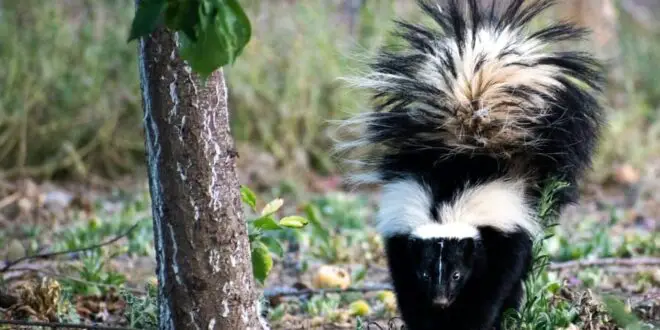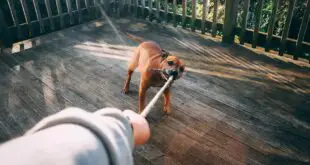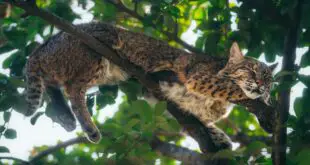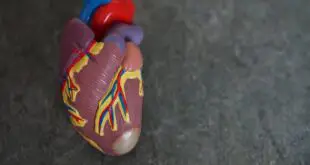Many online sources and rumors from friends must have got you wondering: Does human urine repel skunk?
This is a common question since skunks are a big menace, and property owners always look for new and effective ways to eliminate them.
There are many expensive ways to eliminate skunks from your property, but it would seem that you can use nature to defeat nature in this case. Is there any validity to this theory? Let us get into the details and find out more;
Does Human Urine Repel Skunks?
Human urine will repel skunks from your property if the stench is strong enough. The smell indicates the presence of a potential predator, and since skunks are timid, they will avoid foraging in such areas.
You can also use ammonia solutions since they have the same scent as human urine, only in higher concentrations.
What Attracts Skunks To Your Yard?
First, determine what in your yard draws in those elusive animals. Simple things in the yard, such as a herb garden or bird feeder, may attract them unwittingly.
Sometimes, the lure is more subtle, such as having an unsealed place beneath your deck or shed.
1. Skunks love open garbage cans
Skunks, like raccoons, have no reservations about diving into the garbage can in search of food scraps.
Trash cans that collapse and expose waste serve as an open buffet for skunks and other wildlife. Skunks can’t see garbage, but they sure can smell it!
According to the University of California, skunks have poor vision but compensate by having a high sense of smell and acute hearing.
Use a lid lock to deter skunks from feeding on a garbage buffet in your yard.
Alternatively, you can store your rubbish in a garage or shed until pick-up day or secure the lid with elastic cords.
2. Outdoor pet feeding stations
Skunks are highly driven by food. If they find a food supply that is easy to access and needs little energy, they will return night after night.
Skunks will likely enter your yard if you leave pet food out overnight. Even if it is not their favorite cuisine, they will see it as a quick lunch and eat it.
Skunks are primarily active at night but can also be seen at dawn and dusk. They are less inclined to take pet food during the daytime, especially if your pet is present.
As a result, it’s best to collect any leftover pet food in the evening, when skunks tend to be active. You can replace it again in the morning or, better yet, feed your pet indoors.
3. Skunks Often Look For Bugs In Your Soil
Skunks are omnivores, meaning they consume both plants and animals. Their favorite diet is insects and grubs found by digging in the soil.
Unfortunately, the more you care for your grass, the more probable you will have insects and grubs underneath the soil that will draw in skunks. Good grass is rich in nutrients and water, providing an ideal home for soil-dwelling insects.
Skunks will leave signs if they plunder your grass for insects and grubs. According to Colorado State University, they make cone-shaped holes that are 3-4 inches deep.
Your initial thought may be to use a pesticide on your lawn to kill the insects in the soil. This can have repercussions by upsetting the natural balance of beneficial organisms in the ground.
4. Your Yard Could Offer Skunks Shelter
Skunks are burrowing mammals. They reside in holes; other animals may dig out and widen to fit a skunk.
Burrows are simple to find in forests but not so much in suburban neighborhoods. Skunks who live near humans may dig their holes elsewhere, such as under a porch, shed, brush pile, old building materials, or timber.
Finding any of these buildings or materials in your yard could attract skunks trying to make a den. Seal these spots and eliminate brush piles or building items lying about the yard.
How To Get Rid Of Skunks
Any farm or backyard owner must know the most effective ways to eliminate skunks without damaging their property. Skunks are destructive animals that could ruin crops and hurt your pets or humans, so you must eliminate them immediately.
1. Apply Strong Scents To Repel Skunks
Skunks have a sensitive sense of smell and, like lizards, can be quickly deterred by spraying strong odors in your garden, such as citrus or castor oil.
Distribute fresh orange and lime peels around your garden to deter skunks, or spray a solution of half a liter each of castor oil and dish detergent diluted in a gallon of water around the perimeter of your yard.
To be effective, this process should be repeated multiple times, especially after rain.
2. Remove Their Food Source
Removing an animal’s food source is a universal approach to repelling pests like skunks.
Although this strategy is challenging, using things like DIY bug sprays and intelligent companion planting regularly is an excellent way to dissuade bugs from contributing to great skunk feasts.
3. Install A Bright Garden Light
Because skunks are typically skittish, bright lights, particularly ones on a motion sensor, might frighten them and cause them to flee.
Furthermore, because the nocturnal skunk’s eyes are sensitive, bright lights may irritate their vision, making their stay in the region unpleasant without physically injuring them.
Consider incorporating floodlights into your outdoor lighting options to deter various pests, including skunks.
4. Clean Up Your Yard
Skunks can make their homes from overgrown plants, shrubs, fallen logs, and various construction materials.
While skunks often build houses in shallow burrows, these features provide excellent protection from the weather.
When cleaning up your yard and adopting new landscaping ideas, remember to remove trash and conceal or secure your waste containers so that skunks are not motivated to forage for scraps.
5. Let Your Dog Outside More
Allowing pets to explore the backyard is an excellent natural technique to eliminate skunks. Dogs, for example, will scent the area and alert the skunk of a nearby attacker, discouraging them from lingering on your property.
Furthermore, a dog’s loud bark and rowdy behavior can scare away skunks. If you don’t have a pet, consider purchasing predator urine from a garden center for marking your garden and keeping skunks away.
6. Call A Professional
Consulting a specialist may be a good idea if none of these alternatives work. Professional animal control professionals will be familiar with local laws and have the tools to humanely remove and relocate creatures such as skunks using traps.
Skunks, like moles, are drawn to your garden because of its plentiful food sources. One of the best ways to keep skunks away is to treat garden pests to make your yard an unappealing place for them to live.
Investing in good fences for smaller spaces may be beneficial, especially when it comes to your vegetable garden ideas.
Public Health Concerns and Safety Risks
Carrying rabies is one of the most prevalent health hazards linked with skunks. Although not all skunks exhibit rabies symptoms, this does not indicate they do not carry the illness.
Rabies can be transmitted to humans or pets by bites or ingestion of skunk droppings. However, it is crucial to note that skunks are usually not violent animals unless threatened.
This means that inquisitive pets are more inclined to scare skunks, increasing the possibility of being bitten or sprayed.
Skunks can also carry and transmit diseases such as leptospirosis, Q-fever, tularemia, canine distemper, canine hepatitis, and listeriosis. Skunks can carry all of these illnesses without displaying any noticeable or distinguishable signs.
Skunks and other wildlife species may carry ticks, fleas, lice, roundworms, tapeworms, and other parasites.
All of these can harm humans and pets; therefore, if a significant skunk infestation is discovered, it is essential to be aware of these diseases and to test for them if necessary.
Skunks are extremely dangerous to pets because their spray can inflict blistering and temporary blindness. Fortunately, no disease-carrying skunk spray has been discovered.
If your pet was sprayed, it does not indicate they will get a disease unless they were also bitten. Letting a veterinarian examine them after being sprayed by a skunk is safer.
If you come into contact with a skunk, avoid making rapid movements, as this may frighten them and cause them to spray.
That spray is nasty and hard to eliminate, so watch out for any signs of aggression and keep your distance.
Conclusion
For the readers wondering, does human urine repel skunks? You now have a good answer and can care better for your yard.
Skunks are rather shy, and the smell of human urine makes them think there is a predator in the area, so they will avoid your yard or garden.
Dog urine will have a similar effect, so let your dog go out and play in the yard, and their presence will deter skunks.
The best move is to ensure there isn’t any food or habitat for the smelly critter so they don’t have a reason to come to your home.
 Being Human
Being Human





